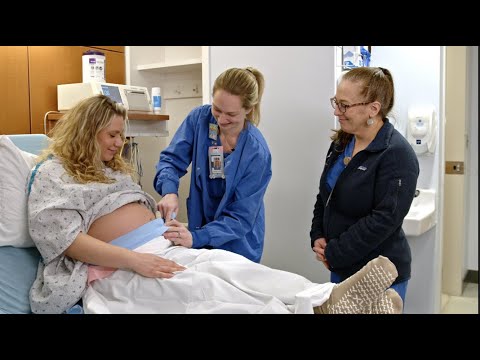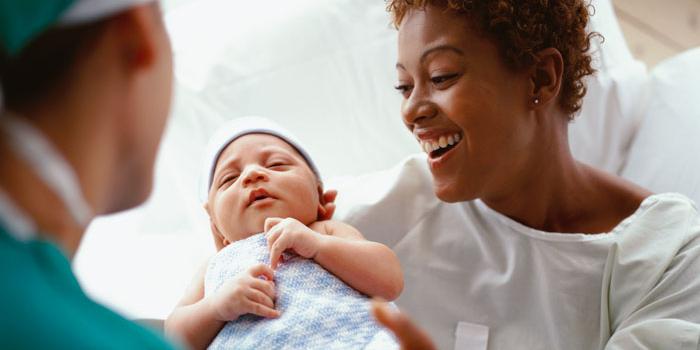What to Expect at Beginnings Maternity Center

Video: Welcome to Reading Hospital Beginnings Maternity Center
Learn more about Reading Hospital's maternity services. Watch our video walkthrough or take a tour in person (requires appointment).

All Labor and Delivery Services
When it comes to your child’s birth, you want an experienced team by your side and a place where you feel comfortable. Our goal is to make your experience as joyful as possible and provide a safe, supportive environment.
- Obstetrical (OB) Triage. When you arrive, you may first be seen in the OB triage. This is a comfortable area where patients with labor symptoms or other pregnancy concerns are evaluated and cared for. Some of the care provided in the OB Triage may include monitoring your baby's heart rate and contraction pattern. It may also include testing for ruptured membranes, other tests, and observation. This evaluation leads to decisions that may include your discharge home or admission to our Antepartum Unit or the Labor and Delivery Unit.
- Antepartum Unit (R2 East). This unit cares for pregnant patients. Care could include monitoring contractions and the baby's heart rate, while providing for other physical needs. R2 East is also where parents of Neonatal Intensive Care (NICU) babies stay so that they are as close as possible. R2 East also cares for postpartum parents and babies. All rooms are private.
- Labor and Delivery Unit (R2 South). During your stay at Labor and Delivery, you will birth your baby in a private room. We believe in family bonding and welcome your partner or support person to join you. If you have a vaginal delivery or a C-section, our specially trained staff will be with you every step of the way. After delivering your baby, expect a one-to-two-hour recovery period before transfer to the postpartum unit.
- Postpartum Unit (R1 East). After recovery, you and your newborn baby will be transferred to our Postpartum Unit. Your baby will remain in your room with you throughout your hospital stay to promote feeding and bonding. All rooms are private.
- Neonatal Intensive Care Unit (NICU). Should your baby need extra care, our onsite neonatologist and neonatal nurses can come right to Labor and Delivery to provide care. They may admit your baby to the NICU located on R2.
- Pediatrics (C2). This unit is designed to care for pediatric patients (birth - 18 years) in a family-centered environment, which includes sleeping accommodations for a parent and is staffed with skilled pediatric nurses and pediatric hospitalists.
Who May Be Present for the Birth?
Our team wants to give you and your new family the best birth experience possible. To do this, we must also keep a safe environment for all our patients. It is important for you to be supported by those people who are closest to you and will care for your needs, while you are in the hospital.
Here are some of our visitation guidelines, so you'll know what to expect throughout your stay. Please be advised, the visitor policy may be adjusted for public health concerns. Thank you in advance for following these basic rules:
- OB Triage. You may have one support person at a time with you in OB Triage. Other visitors will be asked to wait in the waiting room or other locations.
- Labor and Delivery (R2 South). You may have up to two visitors in the room at a time. A doula is considered part of the care team and is welcome to be present with you.
- Operating Room. If you are having a cesarean section, you may have one support person with you in the operating room. If general anesthesia is needed, no visitors will be allowed in the operating room.
- Postpartum Unit (R1East) or Antepartum Unit (R2 East). You may have up to two visitors in the room at a time.
Visiting Guidelines
We understand how meaningful it is to have your loved ones with you at this special time. We encourage support person participation if it is safe for you and your baby. Talk to your healthcare provider about visitor guidelines during labor and delivery including visitor regulations for C-section deliveries.
- Your postpartum stay is a special time to bond with your baby and establish feeding patterns. Consider asking your friends and family to visit after you and your baby go home.
- Prior to arrival at the unit, visitors must check-in with security at a lobby entrance to receive a visitor badge.
- If your obstetrical care team feels you would benefit from a quieter setting, we may ask visitors to wait in the waiting room.
- Children under 13 must have an adult, other than the patient, with them at all times.
- Visitors must follow all hospital policies, including obtaining a visitor badge each day from security and wearing it during their visit.
- Clergy members, with proper identification, are always welcome.
- No one should be sick while visiting you and your newborn.
- Visitors must use hand sanitizer before entering your room or touching your baby. Hand sanitizer is available in every room.
Security and Safety Measures
- Each Beginnings Maternity Center unit is locked for the safety of you and your newborn. Visitors will need to ring at the entrance to gain access and may only visit with your permission. We want to ensure you have time to rest and bond with your baby. If you would rather not have visitors, please let us know.
- Each newborn admitted to R2 East and R1 East receives a HUGS security bracelet. This important security feature provides an added layer of electronic security.
Photos and Videos During Delivery
We strongly recommend that all photography wait until after the birth of your baby for your comfort and care. Our recommendation is that your support person focuses on the most important part of the role, which is to assist you throughout your labor and delivery.
- Video recording is not permitted during delivery. After delivery, video recording should be discussed with your healthcare team.
- You may be asked not to use your recording device if your provider finds it intrusive or affects your and your baby's care.
